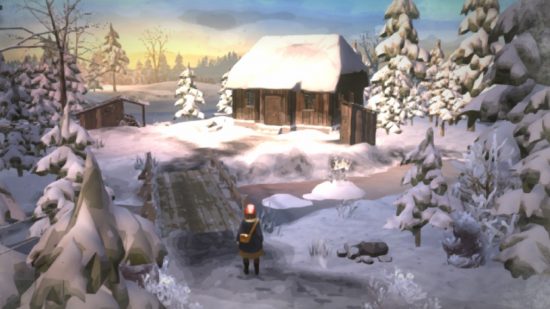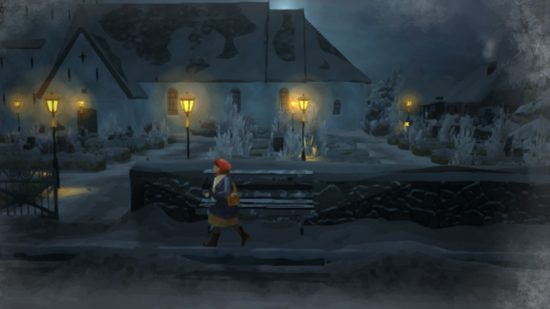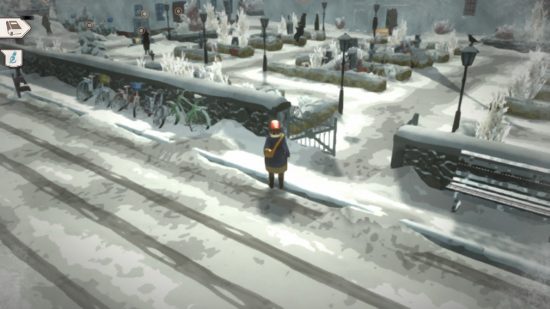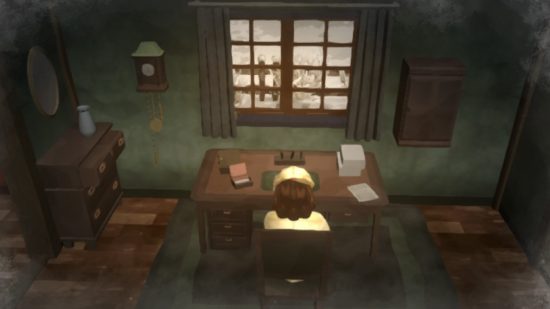Our Verdict
Gerda: A Flame in Winter is an important narrative adventure that stands shoulder-to-shoulder with publisher Don’t Nod’s stable of similar titles. Just don’t expect to be smiling your way through this slow-paced and sombre experience
Gerda: A Flame in Winter is a top-down, narrative-driven RPG from PortaPlay and is the first game to be published by Don’t Nod. Set in a small town in Nazi-occupied Denmark during World War Two, it has you play as half-German, half-Danish Gerda as she navigates the dangers and politics of the time. It’s a game that carries an important message that’s more relevant now than ever, and it does so with a great game, but its focus on these events means that if you’re not in the mood for a serious history lesson, then it likely won’t gel with you.
The game really gets going when, near the beginning of the game, the Gestapo (Nazi secret police) visit her home and take her husband for questioning because he’s been helping the Danish resistance. This plunges Gerda into a world of intrigue and tugs her in two directions due to her affiliation with both Denmark and Germany and their respective inhabitants.
Gerda: A Flame in Winter, like most games published by Don’t Nod, is heavy on making narrative choices that will affect your playthrough. Whether it be choosing who to give medicine to or which faction to help, every decision you make will affect how the story plays out and what people’s opinions of you are.
Your standing with the game’s factions (Danes, Germans, Nazi occupation, and resistance) is shown as a positive or negative number and people from respective groups will treat you accordingly. Some dialogue choices, for example, are locked if your standing with a faction is too low, affecting how events play out around you.
You also have three stats – insight, wit, and compassion – that similarly affect what you can say or do in the game. You accrue points in each of these areas after events and encounters. You choose one of three responses to the event you just experienced, and that gives you an extra point in one of these stats. Having insight points will let you get the story behind a refugee and her child, for instance, because you have the insightfulness to put the clues of their story together without them having to directly tell you.
This is Gerda: A Flame in Winter’s gameplay loop, but its story plays out across a number of times and days. You only have a finite time in a day and so there’s a great emphasis on focusing on what matters to you because there’s no way you can visit all locations in the allotted time. Do you want to put your faith in a turncoat German soldier, or would you rather steal penicillin to help a pastor?
When you eventually choose what to spend your time doing, the game plays out like a top-down adventure game, with you directly guiding Gerda around the world, making her examine items and talk to people. There aren’t any puzzles per se, but items you stash away in your inventory do play a crucial role in some outcomes, so it’s definitely an experience that slower-paced players will enjoy, as they go about the locations reading lore and finding out more about what’s going on around them.
Of course, you might think your overall goal is to free your husband, Anders, from the clutches of the Germans, but the game throws interconnected events in the way and makes you philosophise whether saving someone for personal desire is better than helping helpless victims for the greater good.
These hard-hitting plot points along the way are where Gerda: A Flame in Winter really shines, and the various outcomes and choices you can make to these plot points also provide extensive replayability, which is good because it can be completed in under eight hours otherwise. That might sound short to some, but it doesn’t overstay its welcome and feels just right.
When all is said and done, you can’t really call a game about Nazi oppression and persecution fun, but it’s an important one. The way Gerda straddles the blurred lines of being both Danish and German and whether being German automatically means being a Nazi is perhaps more relevant now than ever in a world that is increasingly divided by people taking defined sides in all matters.
Players looking for Don’t Nod’s quintessential narrative-driven poignancy will certainly find that in Gerda: A Flame in Winter, but there aren’t a lot of other gameplay elements to be found for those not bitten by the storytelling bug this slow-paced adventure brings. Nevertheless, it’s a great game about a lesser-known area of World War Two, and an insightful and interesting one at that.



